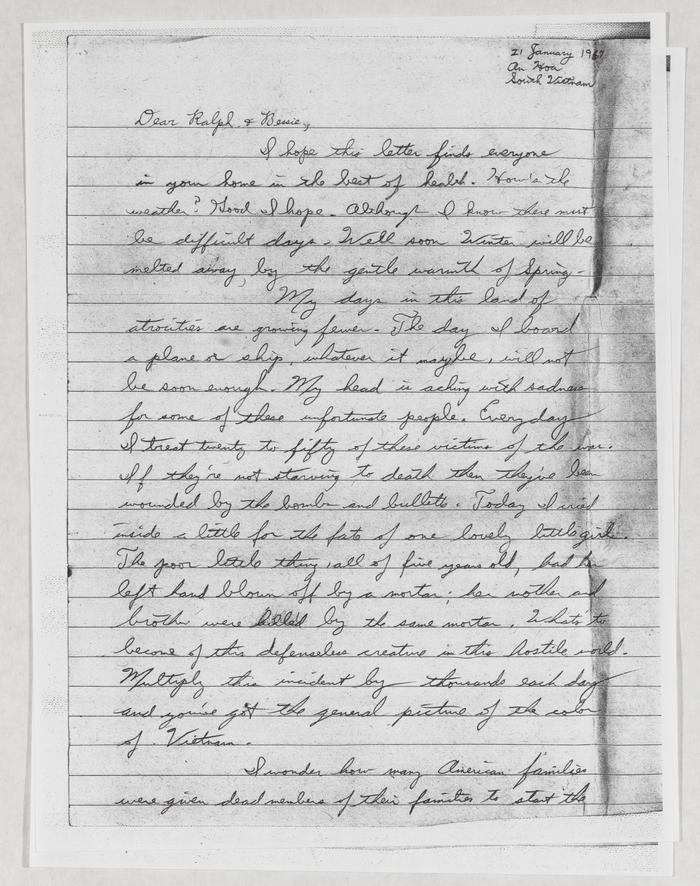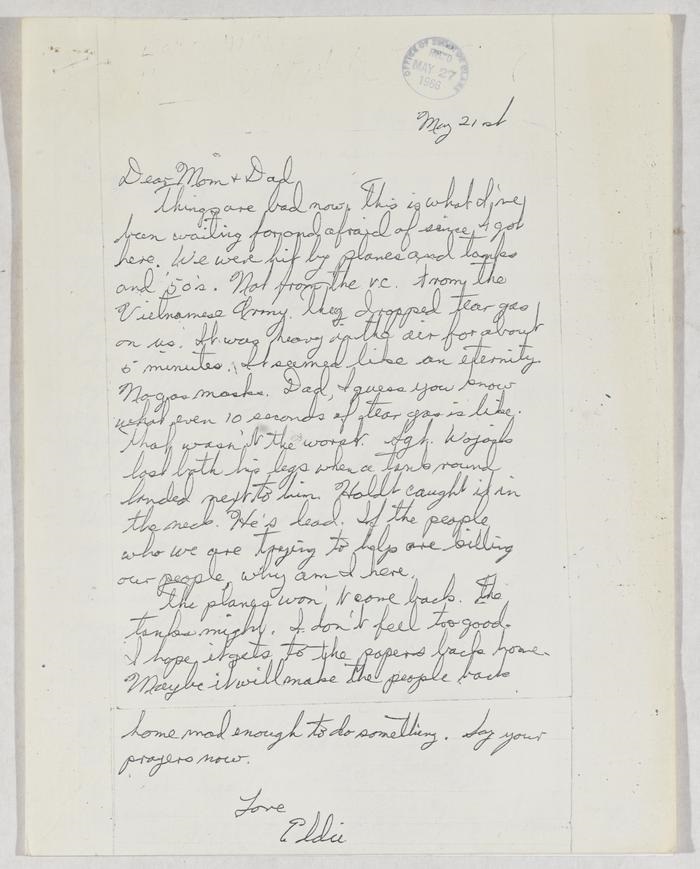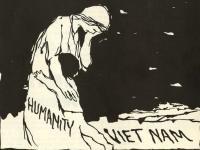by Kim McCleary, Education Manager
The Vietnam War lasted from November 1, 1955 through April 30, 1975. Intensified by the ongoing Cold War, the Vietnam War pitted American GIs stationed in South Vietnam against communist North Vietnamese and their allies fighting to overtake South Vietnam. Much of the war was fought in a non-traditional guerilla style, and there were many casualties on both sides. As the war continued and the media brought it into American homes in a graphic way, it became increasingly unpopular with the American public. This complex war created a heated political climate and was one of the most unpopular and divisive wars in U.S. history. People from every corner of society expressed strong feelings, many of which were negative.
Many people still widely believe that Vietnam-era soldiers despised the civilian antiwar movement at home and that the antiwar movement thrived on denouncing and insulting U.S troops. But as sources in our collection reveal, dissent for the war came from all sides—soldiers and citizens alike.

An open letter to president Johnson signed by several hundred university faculty questioning the United States war with Vietnam, March 1, 1965
While some soldiers did indeed resent the antiwar movement, thousands of soldiers also actively opposed the Vietnam War. They petitioned, demonstrated, and organized opposition, from San Francisco to New York, from Idaho to South Carolina, and even in Vietnam. As the fighting stretched on, many soldiers grew disillusioned with the war and distrustful of the American government. The government insisted the war was being won, but from the soldier's perspective, the war was far from over. The increased physical and psychological deterioration that both volunteers and draftees experienced led to high rates of drug abuse and post-traumatic stress disorder (PTSD). Illicit drugs like marijuana, opium, morphine, and heroin were widely available to American soldiers in Vietnam. The frustration in some units contributed to a breakdown in the discipline leading to mutinies and desertion.
Letters in HSP’s collection from Marine and Upper Darby native PFC Edward Woods Jr. and Navy Medic Louis Piatetsky offer personal perspectives on a soldier’s life in Vietnam with graphic details. The letters between these two soldiers and their friends and family back home revel the horrors of war they witnessed on the battlefield and their longing for an end to the conflict.
Piatetsky refers to Vietnam as “the land of atrocities” in a 1967 letter home. He recounts treating between 20 and 50 soldiers and civilians every day for starvation and wounds. “Today I cried inside a little for the fate of one lovely little girl”, he writes. “The poor little thing, all of five years old, had her left hand blown off by a mortar; her mother and brother were killed by the same mortar. What’s to become of this defenseless creature in the hostile world?”

Letter written by Marine medic Louis Piatetsky to friends from home while he was serving in Vietnam, May 11, 1966
Woods, meanwhile, concludes one of his letters with a list of moments of misery and happiness in Vietnam. One extract reads “Misery is not knowing who is trying to kill you (so is frustration). Happiness is having so many people praying for you. Misery is running out of soap. Happiness is finding a new bunch of comic books at the PX [military store]”. While not as shocking as Piatetsky’s writing, Woods’ letters reveal a total disillusionment with the war and a longing to return home. Soldiers wrote hundreds of similar letters to family, friends, and political leaders.

Letter written by PFC Edward Woods, stationed in Vietnam, to his family in Upper Darby, May 19, 1966
These letters illuminate only a small portion of the forgotten world of Vietnam-era soldier dissent. Protest from soldiers on the front was a vital part of the larger antiwar movement. When we imagine the Vietnam-era antiwar movement, we typically think of students or religious pacifists speaking out on campuses, marching in the streets, or burning their draft cards. Many women, college professors, and senators did speak out against the war in a public way, as evidenced by items in HSP’s collection like an open letter of protest from college professors to President Johnson or an anti-war brochure put out by Women Strike for Peace. But, we do not usually think about the American soldiers who circulated antiwar papers, staged peace demonstrations, or petitioned for their First Amendment rights.
Nearly a half-century later, the shadow of the Vietnam War still hovers over American politics. No war is easy for those who fight it and those left behind on the home front. Soldiers in the Vietnam War endured many hardships and faced many problems, some of them seemingly insurmountable. The Vietnam conflict was a 360-degree war where American soldiers encountered attacks, ambushes and booby traps at any place or time from a guerrilla army that operated in the shadows. As PFC Edward Woods Jr. wrote: “I hope it [this war experience] gets to the papers back home. Maybe it will make the people back home mad enough to do something. Say your prayers now.”
References:
Louis I. Piatetsky War Correspondence [electronic Resource]. 1966. Historical Society of Pennsylvania.
Open Letter to President Johnson On Vietnam, The New York Times [electronic Resource]. 1965. Historical Society of Pennsylvania.
PFC Edward Woods Vietnam Correspondence [electronic Resource]. 1966. Historical Society of Pennsylvania.
Women Strike for Peace. What Price, Vietnam? Women Strike for Peace Pamphlet [electronic Resource]. 1965. Historical Society of Pennsylvania.

